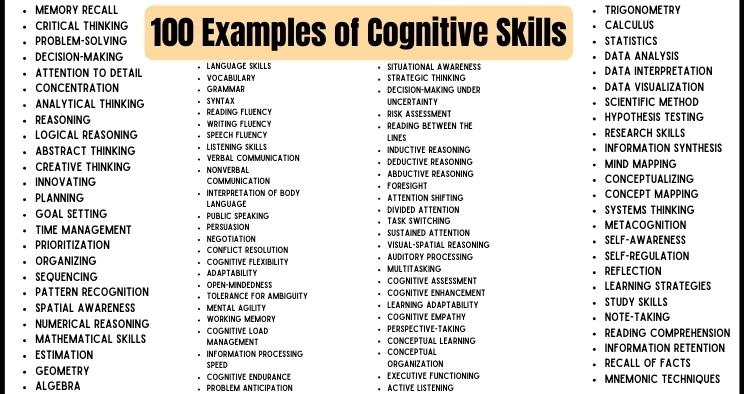Cognitive skills are the fundamental mental processes and abilities that allow us to process information, make decisions, and solve problems. These skills encompass a wide range of abilities, including perception, attention, memory, reasoning, and problem-solving.
Examples of cognitive skills include critical thinking, decision-making, attention to detail, logical reasoning, spatial awareness, and creativity. These skills are essential for success in many areas of life, including academics, work, and personal relationships. Developing and improving cognitive skills can lead to increased confidence, better decision-making, and greater overall success.
Also Read: Examples of Ansible
List of Examples of Cognitive Skills
A complete list of 100 examples of cognitive examples is given below:
- Memory recall
- Critical thinking
- Problem-solving
- Decision-making
- Attention to detail
- Concentration
- Analytical thinking
- Reasoning
- Logical reasoning
- Abstract thinking
- Creative thinking
- Innovating
- Planning
- Goal setting
- Time management
- Prioritization
- Organizing
- Sequencing
- Pattern recognition
- Spatial awareness
- Numerical reasoning
- Mathematical skills
- Estimation
- Geometry
- Algebra
- Trigonometry
- Calculus
- Statistics
- Data analysis
- Data interpretation
- Data visualization
- Scientific method
- Hypothesis testing
- Research skills
- Information synthesis
- Mind mapping
- Conceptualizing
- Concept mapping
- Systems thinking
- Metacognition
- Self-awareness
- Self-regulation
- Reflection
- Learning strategies
- Study skills
- Note-taking
- Reading comprehension
- Information retention
- Recall of facts
- Mnemonic techniques
- Language skills
- Vocabulary
- Grammar
- Syntax
- Reading fluency
- Writing fluency
- Speech fluency
- Listening skills
- Verbal communication
- Nonverbal communication
- Interpretation of body language
- Public speaking
- Persuasion
- Negotiation
- Conflict resolution
- Cognitive flexibility
- Adaptability
- Open-mindedness
- Tolerance for ambiguity
- Mental agility
- Working memory
- Cognitive load management
- Information processing speed
- Cognitive endurance
- Problem anticipation
- Situational awareness
- Strategic thinking
- Decision-making under uncertainty
- Risk assessment
- Reading between the lines
- Inductive reasoning
- Deductive reasoning
- Abductive reasoning
- Foresight
- Attention shifting
- Divided attention
- Task switching
- Sustained attention
- Visual-spatial reasoning
- Auditory processing
- Multitasking
- Cognitive assessment
- Cognitive enhancement
- Learning adaptability
- Cognitive empathy
- Perspective-taking
- Conceptual learning
- Conceptual organization
- Executive functioning
- Active listening
These are just a few examples of the many cognitive skills that humans use in their daily lives to navigate and interact with the world around them. Different tasks and activities may require different combinations of these skills, and individuals may develop and utilize them to varying degrees depending on their personal and professional needs.

